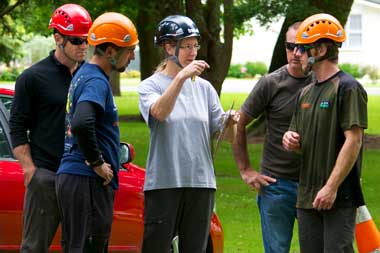The Open Masters event has proved to be an excellent formula for competitive tree climber training and development.
Matt Glen's original concept allowed climbers the opportunity to experience a 'Masters' without having to qualify by completing the preliminary competitive events.
And the format can be easily completed in a few hours which makes it far more interesting for spectators.
But the benefits of the Open Masters are more holistic than the climb itself.
Whanganui is the first center outside of Auckland to host an Open Masters where you could easily see the benefits of the event in action.
Firstly, the climbers, and the trees, were local so the pressure to perform was somewhat diminished.
Reduced pressure to perform has multiple benefits and also attracts climbers who might not ordinarily be involved in competitive climbing.
All participants are expected to judge or act as timekeepers. This exposes them to the competition rules which are often applied in a relaxed way - not blatantly unsafe, but certainly far less stringent and intimidating than a 'real' competition would present.
As is typical of all tree climbing comps, feedback from the judges is an essential part of the process, and again, everyone is involved - this is peer review in action.
There is a bit of work required to make these events happen but it is well worth the effort.
Clay Winter and Nicky Ward-Allen should be congratulated in organizing the River City event which attracted plenty of local support particularly spectators.
Even the local daily paper, the Whanganui Chronicle had reporters and photographers in attendance - all good for the cause!
Womens world record foot lock holder Nicky Ward-Allen (center) conferring with fellow judges at the 2012 River City Open Masters in Whanganui on Tuesday January 3. More pictures on Flickr

